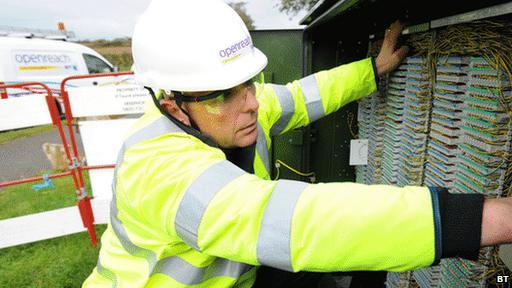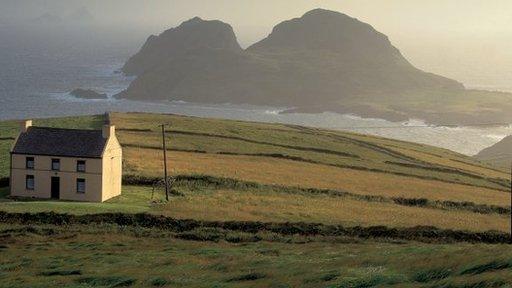One million UK properties on 'superfast broadband' after investment
- Published
- comments

The UK's broadband speeds are faster than in some European neighbours but lag behind those of other nations
The UK's culture secretary has said that more than a million properties now have access to "superfast broadband speeds" as a result of a government-backed rollout of the tech.
Sajid Javid added that the effort was "firmly on track" to offer high-speed internet to 95% of UK homes and businesses by 2017.
He said that fast speeds were "totally transforming the way we live and work".
But many have questioned the quality of access and speeds advertised.
'Not good enough'
Superfast broadband is defined by the European Union as speeds of 24Mbps or above. The UK government's ambition is to provide 95% of the UK with those speeds or higher by 2017, with the rest having a minimum speed of 2Mbps.
By contrast, Finland plans to have a baseline speed that is more than four times faster - 100Mbps - by next year, while South Korea wants to see citizens equipped with 1Gbps connections by 2017.
The Federation of Small Businesses (FSB) has said that the UK's broadband target is simply not ambitious enough when compared with other nations and wants the government to commit to delivering a minimum of 10Mbps for all homes and businesses by 2018-19.
John Allan, FSB's national chairman, told the BBC that "there is still a long way to go".
"Small businesses are increasingly reliant on digital services, but too many are without decent and affordable broadband that meets their needs. This restricts their ability to grow, innovate and compete in global markets.
"Leaving 5% of the UK without adequate broadband in 2017 is simply not good enough. "
But the UK government says the current UK coverage of superfast broadband is the highest of the five biggest European economies.
Rural access
The government has also set aside millions to improve broadband access in rural areas.

BT has a monopoly on rural broadband rollout
But BDUK, the group set up to spend the £530m of government money for the rural internet initiative, has come in for criticism for delays in distributing funds to councils and for awarding every contract to BT.
"Getting fibre to rural areas is hard, and often complex, work, but we are making great progress," said Gavin Patterson, the chief executive of BT, adding that it was laying undersea cables to the Outer Hebrides, for example.
"Some of the early projects are close to completion, and further funds will be released if we come in under-budget or take-up exceeds expectations," he said.
A Commons Public Accounts Committee report criticised the government for wasting taxpayers' money by giving all of its broadband funds to BT.
The FSB has said that coverage in rural areas is "either very poor or non-existent".
Alternative providers are already in place. B4RN (Broadband for the Rural North), for example, offers broadband speeds of up to 1Gbps to about 350 homes currently. But since BT signed contracts with councils around the UK, the plug has been pulled on several community-based schemes.
Malcolm Corbett, head of the Independent Network Co-operative Association, external, which represents some of the smaller broadband suppliers, told the BBC: "It is great that the rollout programme is making good progress. However, there are far too many homes and businesses in both rural and urban areas that won't see any benefit for some years to come.
"Fortunately there is a growing sector of independent providers that are stepping up to fill the void," he added, citing projects like CityFibre, which is developing a portfolio to bring ultra-high-speed broadband to York, Peterborough, Coventry, Bournemouth, and more.
Andrew Ferguson, the editor of thinkbroadband.com, told the BBC that the focus was now on those 5% of people in the "most remote and hardest parts" of the UK not covered by the current plans for superfast broadband.
He said that £10m had been invested in a series of pilot projects currently under way in eight locations across the nation to work out how best to get broadband to them.
"The findings will be used to inform future funding bids to ensure everyone benefits from the transformation of the digital landscape currently under way," he added.
- Published14 July 2014

- Published12 November 2013

- Published26 September 2013
